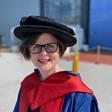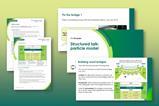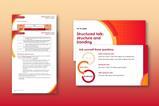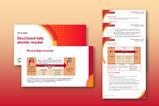Speaking and listening play valuable roles in making science lessons more inclusive

When I was in school, my written work often reflected the words I knew I could spell rather than the words I truly wanted to use. Speaking, on the other hand, felt liberating. Now, as a teacher, I’ve come to see how language can act as both a bridge and a barrier to learning. One major challenge of relying on written work to assess understanding is the delay between students’ thoughts and the feedback they receive. This is why I believe we need to prioritise oracy as a vital tool for learning.
Oracy provides a way to access and demonstrate understanding that might otherwise remain hidden
The Oracy Education Commission’s 2024 report, We need to talk, underscores oracy’s essential role in student development. Oracy refers to the ability to articulate ideas, develop understanding, and engage with others through speaking and listening. It involves learning to talk, learning through talk and learning about talk. For students who struggle with literacy, I believe oracy provides a way to access and demonstrate understanding that might otherwise remain hidden.
The Oracy Education Commission’s 2024 report, We need to talk, underscores oracy’s essential role in student development (pdf: bit.ly/43wcPU9). Oracy refers to the ability to articulate ideas, develop understanding, and engage with others through speaking and listening. It involves learning to talk, learning through talk and learning about talk. For students who struggle with literacy, I believe oracy provides a way to access and demonstrate understanding that might otherwise remain hidden.
Oracy in the chemistry classroom
Talking in class
As a chemistry teacher, I have seen that abstract concepts like bonding and electrolysis are often challenging. However, I know that verbalising these ideas before encountering the technical terms in writing can make a significant difference. Talking through ideas helps to reduce the cognitive load imposed by the task by allowing students to focus on reasoning without the immediate pressure of writing. I have found that a collaborative, verbal approach prepares students to engage more effectively with written tasks and problem-solving activities.
From my experience, structured spoken communication enhances understanding in complex learning environments like the laboratory. Incorporating oracy into practical work fosters deeper comprehension, critical thinking, and teamwork. For example, a well-designed results table with columns for predictions and analysis encourages meaningful discussion, making abstract concepts more tangible.
Encourage learners to discuss
Levelling the playing field
Although traditional literacy skills are essential, I believe that they don’t always capture a student’s intellectual potential. Oracy offers an alternative avenue for students to articulate their ideas, engage with content and demonstrate understanding. Encouraging students to verbalise their thought processes not only boosts confidence but also fosters active participation in their learning journey. For low-literacy learners, this can be transformative.
Find more on oracy on our Literacy in science teaching webpage – including structured talk resources, accessible glossaries and reading comprehension worksheets. One teacher said, ‘Out of all of these resources, this [structured talk resource] is my favourite. I see that this one could make the biggest difference to the pupils I teach.’
Developing oracy in the traditional education system may seem paradoxical. On one hand, we demand quiet compliance to prepare students for exams; on the other, we expect them to engage in discussion, exploration, and critical debate – skills often undervalued in an exam-oriented system. Framing oracy as a tool rather than a standalone subject is key to its success across disciplines.
Planning and scaffolding talk
In my opinion, implementing oracy-focused strategies requires careful planning that includes measurable outcomes. Training is vital to creating inclusive and supportive oracy activities. Subject-specific resources, such as those provided by the Royal Society of Chemistry, can be invaluable. Peer coaching is another effective approach. Recording lessons and analysing the language both teachers and students use can reveal communication challenges and opportunities for improvement.
Planning and scaffolding are critical. Discussions don’t happen spontaneously; they require deliberate preparation. Resources like those on the RSC Education website provide excellent starting points. Examples include Agriculture and ammonia, a reciprocal reading task, the Toxic socks debate and Constructive conversations with talk triplets. Including oral contributions in formative assessments – using tools like a talk tally chart – can also ensure we recognise and value verbal participation.
Planning and scaffolding are critical. Discussions don’t happen spontaneously; they require deliberate preparation. Resources like those on the RSC Education website provide excellent starting points. Examples include ‘Agriculture and ammonia’, a reciprocal reading task (rsc.li/4jgsvpb), the ‘Toxic socks’ debate (rsc.li/4jgszoV) and ‘Constructive conversations with talk triplets’ (rsc.li/41V7Tx5). Including oral contributions in formative assessments – using tools like a talk tally chart – can also ensure we recognise and value verbal participation (rsc.li/3FO03wu).
Building strong communication skills
Oracy beyond the classroom
Not everyone will pursue a career in chemistry, but most will need strong communication skills. The ability to articulate ideas clearly is increasingly valued in the workforce. By emphasising oracy in the classroom, we equip all students – regardless of their literacy levels – with the tools they need to succeed in their future careers.
As the Oracy Education Commission’s report suggests, it’s time to recognise spoken language as a cornerstone of learning. I firmly believe that by integrating oracy into education, we can create more inclusive classrooms and empower students to reach their full potential.
Naomi Hennah is a learning excellence coach for the Bedford College Group
Find more on oracy, including structured talk resources, on our Literacy in science teaching webpage: rsc.li/3FjfkW8














No comments yet